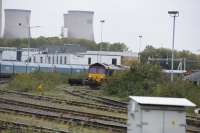This day in history 07 October
Images
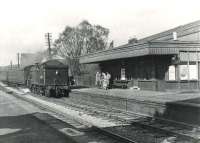
Barnhill: Shortly after starting its journey from Springburn on 7 October 1958, V1 67621 is about to make its first stop at Barnhill with a Milngavie train.
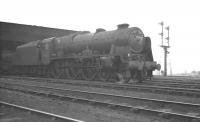
Aston Shed: Royal Scot no 46126 Royal Army Service Corps stands on Aston shed on 7 October 1961.
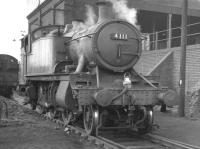
Tyseley: Collett ex-GWR 2-6-2T no 4111 stands on Tyseley shed in October 1961.
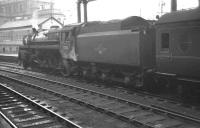
Birmingham New Street: Standard class 5 4-6-0 no 73031 about to take a train out of Birmingham New Street in October 1961.

Doncaster Works: Gresley class J50 0-6-0T no 68917 at Doncaster Works on 7 October 1962.

Wath: Three class EM1 electric locomotives 26027, 26001 and 26025 stand in the locomotive sidings alongside Wath marshalling yard in October 1962 ready to take out coal trains via Woodhead.

Doncaster: Locomotives ready for the road in Doncaster shed yard on 7 October 1962 include A4 60017 Silver Fox, B1 61256, and A4 60032 Gannet.
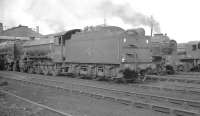
Doncaster: The busy shed yard at Doncaster in October 1962. Locomotives present include (left to right) 9F 2-10-0 92169, O2 2-8-0 63968, A1 Pacific 60122 Curlew and WD Austerity 2-8-0 90096.

Doncaster: Scene in the shed yard at 36A Doncaster on 7 October 1962, with A4 Pacific no 60029 Woodcock centre stage.
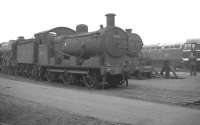
Doncaster Works: J17 0-6-0 65567 awaiting its fate at Doncaster Works on 7 October 1962. The locomotive had been withdrawn from March shed 2 months earlier. This story had a happy ending! See image [[37158]]
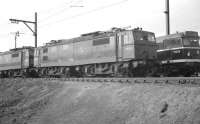
Wath: Electric and diesel locomotives stand in the stabling sidings at the east end of 41C Wath shed on 7 October 1962.

Doncaster Works: The first of the A1s to be withdrawn was 60123 H A Ivatt, following the Offord collision on 7 September 1962. 60123 was hauling a Kings Cross-Ardsley freight when it ran into the rear of a second freight in the down loop at Offord near Huntingdon. The locomotive is seen at Doncaster on 7 October, shortly after being recovered from the accident site and prior to the commencement of cutting up. The Pacific had emerged new from the same works 13 years earlier.
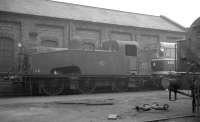
Doncaster Works: A corner of the works yard at Doncaster in October 1962. Departmental locomotive No 10 is former J50 0-6-0 no 68911, previously a resident of Copley Hill shed. Standing alongside is Brush Type 2 no D5674 of Finsbury Park.
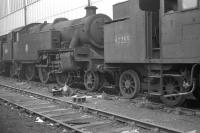
Doncaster Works: Locomotives awaiting the cutter's torch at Doncaster Works in October 1962 include Fairburn 2-6-4T no 42255 and Stanier 2-6-4T no 42527. The latter is one of the original Tilbury tanks, withdrawn from Shoeburyness shed in June of that year following electrification of the route and cut up here a month after the photograph was taken.

Doncaster Works: B1 4-6-0 no 61392 is positively gleaming outside the paint shop at Doncaster Works on 7 October 1962.

Wath: 26005 stands at the head of a lineup of EMI (BR Class 76) 1.5kV DC electric locomotives in October 1962. They are standing in the raised sidings at Wath, awaiting their turns to take coal trains west over the Woodhead route, the task for which they were built. The main Wath marshalling yards are behind the camera, with 41C Wath shed standing off to the left.
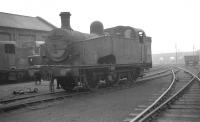
Doncaster Works: A Gresley J50 0-6-0T stands in the works yard at Doncaster in October 1962. After being withdrawn from Ardsley shed in November 1960 as 68914 this locomotive was renumbered as Departmental No 11 and served as a works shunter here until May 1965.
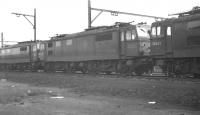
Wath: Class EM1 electric locomotives 26001, 26025 and 26043 awaiting their next call of duty in the shed sidings alongside Wath yard in October 1962.

Doncaster: A3 Pacific no 60112 St Simon looking resplendent in the shed yard at Doncaster on 7 October 1962. The locomotive is fresh from a visit to Doncaster Works - complete with new smoke deflectors. See image [[43601]].
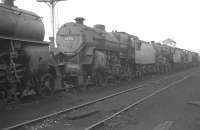
Royston: Stored out of use. Redundant steam locomotives in the sidings alongside Royston shed, South Yorkshire, in October 1962. Crab 2-6-0 42770 would not be officially withdrawn from here for another year. Royston shed (55D) finally closed in 1967.
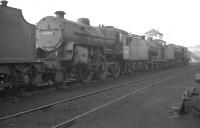
Royston: Crab 2-6-0 no 42762 out of use at 55D Royston shed in October 1962. Located between Barnsley and Normanton, Royston shed was closed in 1967 and demolished by the early 1970s.

Mexborough Shed: J11 0-6-0 no 64442 on the stored locomotive line at Mexborough shed, South Yorkshire, in October 1962. Buit for the Great Central Railway at Gorton Works in 1908 (as GCR class 9J) the locomotive was cut up there in December 1962.
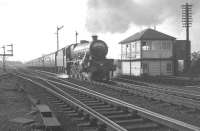
Carlisle Durranhill Shed: 45562 Alberta passing Durranhill Junction box in October 1967 with the 1Z45 Jubilee Railway Society South Yorkshireman No 7 railtour. The train was on its way back from Carlisle to Bradford Exchange via the S&C and Leeds.
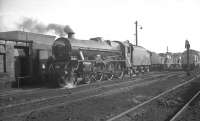
Carlisle Kingmoor Shed: A rose among thorns. Jubilee no 45562 Alberta stands on Kingmoor shed on 7 October 1967. The locomotive had arrived at Carlisle earlier in the day with the Jubilee Railway Society South Yorkshireman No 7 from Bradford Exchange, whch ran via Manchester Victoria and the WCML. Later 45562 took the special back to Bradford via the S&C and Leeds.
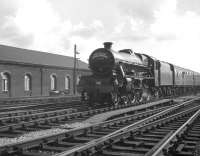
Carlisle: Beautifully turned out Jubilee no 45562 Alberta arriving at Carlisle on 7 October 1967 with the Jubilee Railway Society 'South Yorkshireman No 7' rail tour from Bradford Exchange.
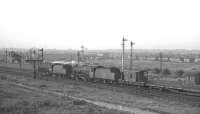
Carlisle Durranhill Shed: Stanier 2-8-0s, 48620+48622 alongside the site of the Midland Railway's Durranhill shed (closed November 1959) with a train of track panels off the Settle and Carlisle route in July 1967. The old NE Durranhill signal box stands on the left alongside the parallel Newcastle and Carlisle lines.
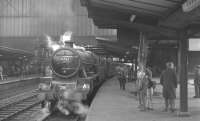
Carlisle: Jubilee no 45562 Alberta waits at Carlisle on 7 October 1967 with the 1Z45 Jubilee Railway Society 'South Yorkshireman' special originating from Bradford Exchange.

Carlisle Durranhill Shed: A double-headed train of track panels approaching Carlisle from the east in July 1967 hauled by 48620+48622. The train is passing the site of the former Midland shed at Durranhill on the Settle and Carlisle route. The old North Eastern Durranhill signal box stands between the parallel MR and NER tracks with the remnants of London Road yard beyond. The train is heading for Petteril Bridge Junction in the left background, the point at which the two routes come together.

Portobello Freightliner Terminal: 'Well hello there... I was wondering if there was any possibility.... ' ... 'None whatsoever.' Two failed propositions at Portobello FLT in October 1968. A railwayman attempts to persuade the reigning 'Miss Rail News' to swap hats, while the new Freightliner Euro-Scot prepares to embark on its inaugural run. This short-lived service, operating via Stratford FLT, thence the Dover - Calais ferry, was eventually abandoned after failing to achieve required loadings. The locomotive employed on this occasion is Deltic D9021 Argyll and Sutherland Highlander. See image [[31344]]
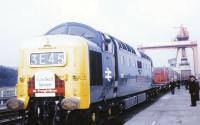
Portobello Freightliner Terminal: D9021 prepares to take the inaugural Euro-Scot away from Portobello FLT in 1968.
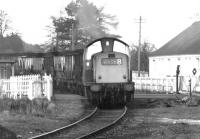
Tillicoultry: A coal train from Dollar passing over the A908 level crossing and about to run through the abandoned platforms of the former Tillicoultry station in the autumn of 1971. The train is on its way to the yards at Alloa with coal for Kincardine power station. For the same view 37 years later see image [[18238]].
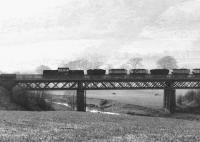
Glenfoot Viaduct: Looking north towards the Ochil Hills west of Tillicoultry on a misty morning in the autumn of 1971. A Clayton Type 1 locomotive is crossing Glenfoot Viaduct over the River Devon at the head of a Dollar - Alloa coal train see image [[3628]].
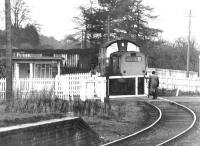
Tillicoultry: Opening the crossing gates over the A908 at Tillicoultry in October 1971. The train is carrying coal from Dollar mine, destined for Kincardine power station. Part of the platform of Tillicoultry station (closed 1964) is on the left.
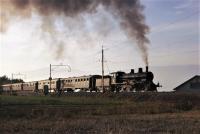
Estavayer-le-Lac: Visitors today generally find the organisation and efficient operation of Swiss railways extraordinarily impressive. I think that has really always been the case, at least in my recollection going back more than sixty years, and good organisation was well in evidence on the occasion of this 1972 photograph. The SBB were running several excellent steam specials in honour of the 125th anniversary of Swiss railways, and on this one the locomotive was the superbly preserved 4-cylinder A 3/5 4-6-0 705, dating from 1904. And naturally the SBB had organised a fine location near Estavayer-le-Lac for a runpast ... rising gradient, plenty of room for photographers, and a good angle to catch the late afternoon autumn sunshine.
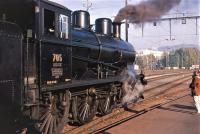
Yverdon: Superbly preserved 4-cylinder compound 4-6-0 705, of Switzerland's class A 3/5 and dating from 1904, photographed at Yverdon on a 1972 excursion from Murten, celebrating the 125th anniversary of Swiss railways.
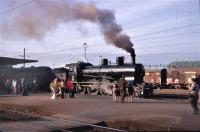
Yverdon: 4-cylinder compound 4-6-0 705, of Switzerland's class A 3/5, photographed at Yverdon in October 1972. This fine locomotive, faintly reminiscent of the Highland Railway's Jones Goods class, was built for the SBB in 1904, albeit from an original design for the Jura-Simplon railway, and gave good service on express passenger work along the Simplon route from Geneva to Brig. Number 705 was preserved by the SBB and still hauls occasional special excursions. This 1972 run was in honour of the 125th anniversary of Swiss railways.
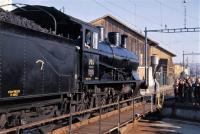
Yverdon: Switzerland's very stylish preserved 4-cylinder A 3/5 4-6-0 705, dating from 1904, pictured on the turntable at Yverdon. An admiring audience was out in force for this 1972 excursion from Murten to mark the 125th anniversary of Swiss railways.
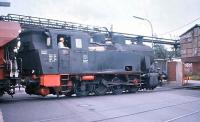
Alsdorf: Scene in the Alsdorf coal and steel complex near Aachen, West Germany, in October 1977.
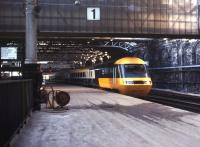
Edinburgh Waverley: An immaculate looking HST stands at Waverley platform 1 in October 1978. Crossing above the train is the enclosed conveyor system used to carry mailbags between the GPO HQ on Waterloo Place and the rail distribution centre just off picture to the left
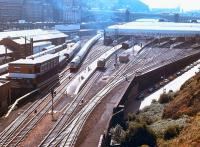
Edinburgh Waverley: View over the east end of Waverley in October 1978, with a class 47 taking a train out of 'sub' platform 21 past the goods depot. The old Waverley East signal box is on the left with the corner of New Street bus depot opposite. The 1977 signalling Centre is in the left background beyond the train.
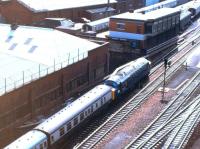
Edinburgh Waverley: A class 40 brings a train out of the Calton Tunnel and into Waverley in October 1978. It is about to cross the bridge over New Street and is passing New Street bus depot on the left with Waverley East box and various buildings and sidings of Waverley Goods beyond.
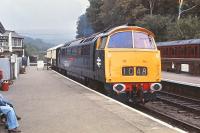
Grosmont: D1048 Western Lady at Grosmont in October 1978.
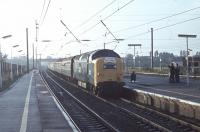
Leyland: 55022 Royal Scots Grey hauls the Deltic Pioneer railtour through Leyland on 7th October 1979. The tour was a circular from Manchester Victoria to Carlisle and Newcastle via the WCML, Tyne Valley and ECML routes. At this time the former D9000 was still in regular BR service and 36 years later is still main line certified in preservation.
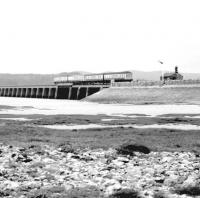
Kent Viaduct: A DMU about to come off the Kent Viaduct at Arnside in the autumn of 1983, having almost cleared the last of the 50 spans of the 1857 structure. The rear two coaches of the train are on the original telescopic opening span.

Kirksanton Level Crossing: A type 2 takes a parcels train over Kirksanton level crossing, between Silecroft and Millom in Cumbria in 1983.

Green Road: A Type 2 heading towards Carnforth and the WCML about to run over Green Road level crossing after passing through the station on 7 October 1983. The locomotive is hauling a lengthy train consisting entirely of condemned DMU stock.
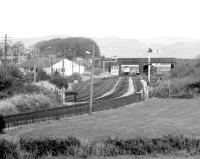
Millom: Looking north east towards Millom station on the Cumbrian Coast line in October 1983 just as a Carlisle - Barrow DMU pulls into platform 1 on the other side of St George's Road bridge. Several sidings still in existence around the station at this time had been associated with the former Millom Ironworks, which closed in 1968 see image [[26680]].

Kent Viaduct: A southbound DMU crossing the River Kent estuary in the north east corner of Morecambe Bay in October 1983. View is west from The Promenade at Arnside, looking towards Grange-over-Sands.
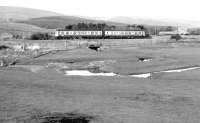
Silecroft: A Carlisle - Barrow DMU approaching the village of Silecroft, Cumbria, on the Furness Line in 1983.
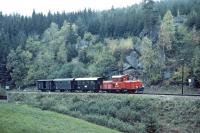
Langschlag: No, not someone's garden railway, but the 760mm Waldviertelbahn of the Austrian State Railways in 1985. No. 2091.007 works a Gmünd to Gross Gerungs train in the vicinity of Langschlag.
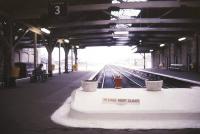
Lowestoft: Please keep clear. Looking out from the station concourse at Lowestoft in October 1988.
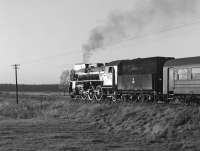
Chwalim: PKP 2-6-2 No. Ol49-81 reflects the late afternoon sun as it pulls away from Chwalim with the 15:52 Wolsztyn - Sulechow on 7 October 1990. The rear three-quarter view hides the fact that the Ol49 is only hauling two coaches, a load well within the capabilities of what is a powerful type with a good turn of speed.
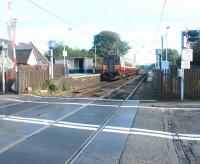
Kingsknowe: View east over Kingsknowe level crossing in October 2002, with a Glasgow Central - Edinburgh service at the platform.
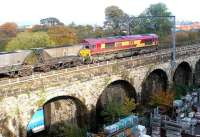
Slateford Viaduct: View of Slateford Viaduct from the parallel Union Canal aqueduct on 7 October 2002, as EWS 66161 crosses with an eastbound coal train.

Kingsknowe: Westbound Edinburgh - Glasgow Central train on Kingsknowe level crossing, October 2002.
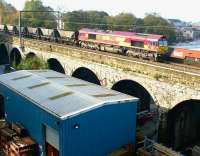
Slateford Viaduct: EWS 66161 heading east over Slateford Viaduct in October 2002 with a loaded coal train from Ravenstruther.
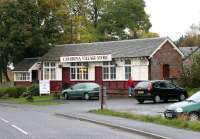
Cardrona: The former Cardrona station and signal box after conversion to a village store, seen here in October 2005.
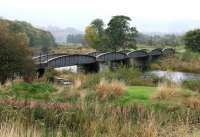
Horsbrugh Viaduct: Background remnants of a stubborn morning mist are still apparent in this view north over the Tweed railway bridge at Cardrona looking toward Peebles in October 2005.

Walkerburn: One of the most remarkable survivors from the heyday of the British railway branch line is the ubiquitous 'former goods shed'. Still seen throughout the country in various guises it appears almost indestructible (apart from the roof). This one was photographed in October 2005 looking south across the River Tweed towards the old goods yard at Walkerburn on the Peebles loop - nice roof!
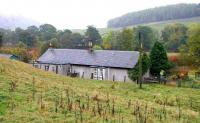
Thornielee: A wet and misty morning in the Tweed Valley, some 5 miles west of Galashiels, in October 2005. View is south towards the river from alongside the A72, looking over the former Thornielee station. Opened in 1866, this wayside stop on the Peebles Loop saw little traffic and was closed in 1950. The station building survives as a private residence.
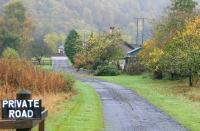
Thornielee: Looking west along the trackbed of the Peebles Railway on 7 October 2005 towards the former Thornielee station. See image [[35315]]
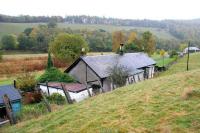
Thornielee: View south west along the Tweed Valley at Thornielee towards Peebles on 7 October 2005. In the foreground is the former Thornielee station, closed in November 1950 and now a private residence.
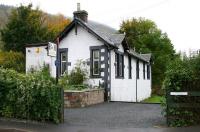
Walkerburn: Entrance to the 1867 station at Walkerburn in October 2005. The line arrived via a level crossing off picture to the left. Note the area between the former canopy and the platform has been incorporated within an extension to the property. View is west towards Innerleithen.
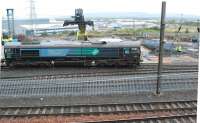
Elderslie: Beyond the DRS locomotive works for the expansion of the WH Malcolm depot can be seen.
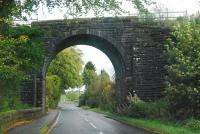
Barrmill: Viaduct to the west of Barrmill station near the RNAD Giffen depot.
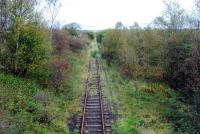
Giffen Junction: Giffen Junction looking to Barrmill. The line straight on was the original, replaced with the line from Lugton East which was to the right but was lifted some time ago.

Giffenmill Viaduct: Giffenmill viaduct, immediately east of Giffen Junction on the line from Giffen to Lugton East, has been demolished. The concrete was crushed and removed.
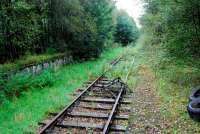
Giffen: Giffen looking to Kilbirnie Junction where the RNAD Giffen sidings were. The track remains in place but is moldering away.

Raith's Farm Sidings: Raiths Farm looking towards Inverness.

Brierfield: Gate-box to the Burnley side of Brierfield on the Colne line in October 2007. The box closed in 2014 and was demolished.

Raith's Farm Sidings: Raiths Farm looking towards Inverness. The running line is in the centre, to the right is the extension of the Dyce loop towards Inverness and to the left is a loop?/locomotive release? line. The depot is to the left.

Livingston North: The Rise of the Machines. View towards Edinburgh on 7 October 2007 from the platform at Livingston North as plant and equipment being used in connection with the doubling of the Bathgate branch advances relentlessly towards the station.

Raith's Farm Sidings: Looking towards Dyce from Raiths Farm. The extending of the Dyce loop is obvious. Also obvious are the semaphore signals and their colour light replacements - presumably to be controlled by Dyce box (in distance). A service from the south terminates in the station.
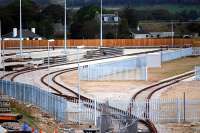
Raith's Farm Sidings: Raiths Farm looking towards Inverness. The running line out of sight to the right. The yard has been laid out as two areas - a compound to the left with multiple sidings and a second compound to the right with lots of space and a single siding.
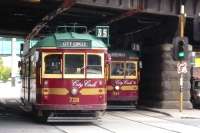
Melbourne Flinders Street: Two City Circle W-class trams pass in Flinders Street on 7 October 2008. This free service for tourists also attracts the locals. The bridge carries the railway lines linking Flinders Street Station to Spencer Street, now called Southern Cross.
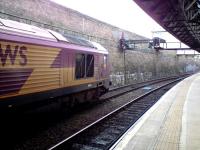
Dundee: EWS 67004 held in the down loop at Dundee on 7 October at the head of the RHT train awaiting passage of an Aberdeen bound service.
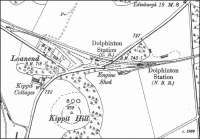
Dolphinton: The rural outpost of Dolphinton, Lanarkshire, in 1900, population around 300. The village was the meeting point of the NB and Caledonian routes from Edinburgh and Carstairs respectively - each with its own station and facilities on opposite sides of the A702! A link line ran below the road bridge. See image [[52042]]
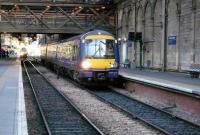
Edinburgh Waverley: 170 394 forms the 1637 service to Dunblane standing at Waverley platform 10 on 7 October 2009.
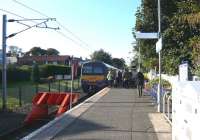
North Berwick: The 10.15 arrival from Waverley at North Berwick on 7 October 2009.
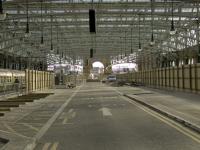
Glasgow Central: The closed car park at Glasgow Central on 7th October 2009 before the site was fully enclosed with protective barriers. The archway in the distance will give access to the new Platform 12 and 13 which will be built here in place of the car park to help boost capacity at the station. See image [[40518]]
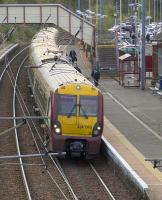
Johnstone: 334040 at the head of a service to Glasgow Central drawing away from Johnstone on 7th October 2009

Arbroath 'The Dens' Siding: EWS 67 004 with the daily railhead treatment train (RHTT) nearing Arbroath station on 7 October 2009.
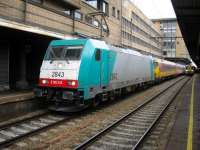
Brussels Midi: A Brussels - Amsterdam service prepares to leave Brussels Midi station on 7th October 2009.

Perth: EWS 67004 waits at Perth with the RHT train on 7 October.
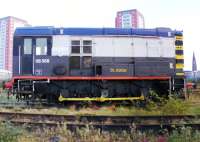
St Rollox Works: Shunter 08568 St Rollox standing in the yard at RailCare, St Rollox, on 7 October 2010.

Killiecrankie Viaduct: Autumn at Killiecrankie, October 2011. Looking across the River Garry towards the railway viaduct.
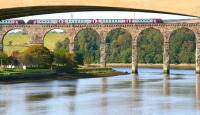
Royal Border Bridge: View west from the mouth of the Tweed in October 2012 as a CrossCountry Voyager combination trundles slowly across the Royal Border Bridge approaching the Berwick stop.
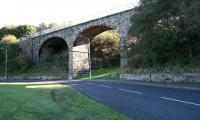
Tweedmouth: Dock Road Viaduct on the former zig-zag line opened in 1878 to link Tweedmouth goods yard with the recently opened Tweed Dock. The viaduct carried the line from the yard down to a reversing spur beyond the shrubbery in the left background, with the final half mile leg running back via a second viaduct and embankment (now both removed) to reach the dock behind the camera. The line was closed during the 1960s, following which part of the route (including the surviving viaduct) was incorporated in a public walkway. View is south east along Dock Road in October 2012.
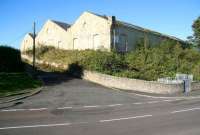
Tweedmouth: The shell of the roundhouse of the former Tweedmouth locomotive shed looking north west from Billendean Terrace in October 2012. Access is no longer possible from here, with padlocked metal gates blocking the top of the ramp opposite. Most of the site now forms part of a building supplies operation, with access from the north west via the A1167 Northumberland Road. Tweedmouth shed was officially closed by BR in June 1966. See image [[42108]]

Tweedmouth: Looking north through the central arch of Dock Road Viaduct, Tweedmouth, on 7 October 2012 see image [[40843]]. The River Tweed runs across the centre of the picture beyond Dock Road itself, with a section of the town walls of Berwick prominent on the north side of the estuary.
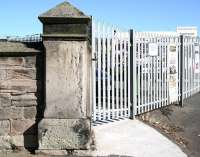
Tweedmouth: The significant surviving gatepost on what was the access road running east off the A 1167 Northumberland Road to Tweedmouth station, photographed in October 2012. The station closed to passengers in June 1964 and the site now hosts a number of commercial premises, including a large building supplies operation. ECML catenary is just visible top left.
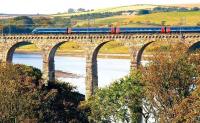
Royal Border Bridge: The 1430 East Coast Edinburgh Waverley - London Kings Cross service photographed crossing the Royal Border Bridge on 7 October 2012 after restarting from Berwick . The trains next scheduled stop will be Newcastle Central.
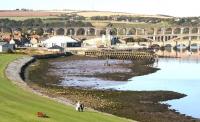
Tweedmouth: Looking west along the Tweed estuary towards Tweed Dock in October 2012. The last leg of the zig-zag of the former freight only branch linking Tweedmouth goods yard with the dock ran along the shoreline here on a falling gradient after crossing a viaduct spanning Dock Road off to the right. Following closure in the 1960s that viaduct was demolished and the area landscaped. Beyond the wooden pier of the dock stand Berwick's three bridges, with the Royal Border Bridge in the background and the 17th century Berwick Bridge ('The Old Bridge') nearest the camera. Photograph taken from the surviving viaduct which carried the second leg of the zig-zag and now forms part of a walkway (see image [[82476]]).
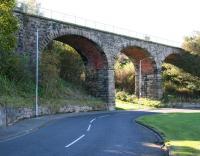
Tweedmouth: In 1878 a goods line was completed linking the yard on the east side of the ECML at Tweedmouth station with the recently opened Tweed Dock. The steeply graded zig-zag route was eventually closed during the 1960s and most of the former branch is now a public walkway. The most significant surviving structure is a viaduct which now forms part of that walkway, seen here in October 2012 looking north west along Dock Road. See image [[40885]]
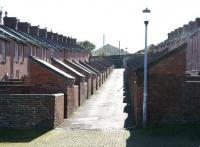
Tweedmouth: A Lancashire town with rows of terraced houses and the obligatory 'dark satanic mill' at the end of the street is a scene much associated with artist L S Lowry. This scene in 2012 is no different - other than for Lancashire read Northumberland and for 'dark satanic mill' read Tweedmouth shed. (Lowry was in fact a regular visitor to the area over the 40 years up to his death in 1976 and 'The Lowry Trail' is now a popular walking route around Berwick and Tweedmouth.)
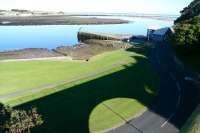
Tweedmouth: View north across the estuary from Tweedmouth's Dock Road Viaduct in October 2012. The final leg of the former zig-zag line descending to reach Tweed Dock ran back across Dock Road on a second viaduct and falling embankment (now removed and landscaped) to reach the dock off picture to the left. Berwick lighthouse can just be seen at the end of the breakwater on the north shore in the distance.

Carntyne: Welcome to Carntyne!
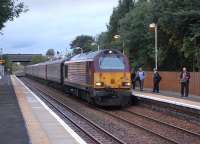
Rosyth: 67011 brings the 07.36 Cardenden - Edinburgh commuter train into Rosyth on 7 October. That Metro must be interesting!

Carntyne: A North Clyde Line service at Carntyne station on 7 October.

Lincoln: GBRF 66733 passes East Holmes SB on 7 October 2013 as it approaches Lincoln Central with a long line of bogie wagons - causing the inevitable delays at the two city centre level crossings.

Carntyne: Volunteers at work on one of the platform displays at Carntyne on 7 October 2013.
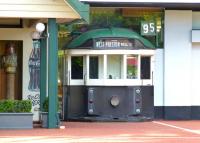
Perth WA: An old Melbourne tram incorporated in a pub in Perth WA - the rest of the vehicle is inside the premises.
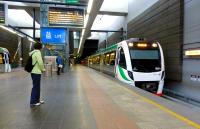
Perth Esplanade: A train for Mandurah at Perth Esplanade subterranean station in October 2014. These trains start at Perth Underground and run on this completely new 70km line opened in 2007. The line runs in the central reservation of the Kwinana Freeway and then alongside other arterial roads. Trains run approximately every 15 minutes off peak and 10 minutes at peak.
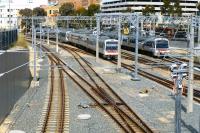
Perth City: Two Transperth emus running in parallel from the east about to enter Perth City station under the bridge on 7 October 2014. No standard gauge here.
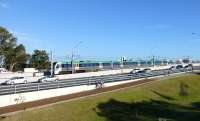
Perth WA: After leaving Perth's Esplanade Station the Mandurah trains face a very steep climb to the Narrows Bridge where they enter the median of the Kwinana Freeway.
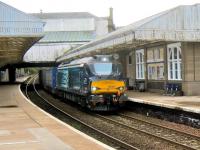
Arbroath: The 1220 Grangemouth - Aberdeen containers northbound through Arbroath on 7 October 2014 behind DRS 68005.
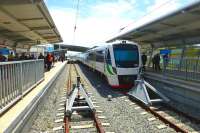
Mandurah: A recent arrival at Mandurah terminus on 7 October 2014. See image [[49127]]
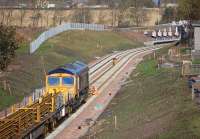
Shawfair: GBRf 66736 continuing tracklaying on the up line to the south of Shawfair Station on 7 October 2014.
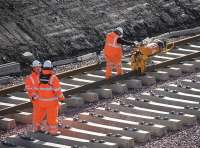
Shawfair: Rail clips being applied to newly laid track at Shawfair on 7 October 2014.
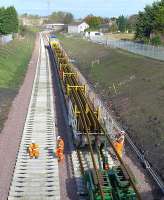
Shawfair: Tracklaying south of Shawfair station on 7 October 2014 with GBRf 66736 at the rear of the train.
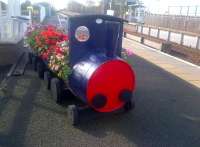
Lochgelly: A particularly fine barrel-train on the platform at Lochgelly in October 2014. This example is looked after by the Benarty Regeneration Action Group (BRAG Enterprises).
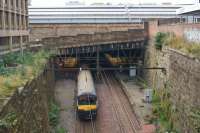
Glasgow Queen Street Low Level: 320310 enters Glasgow Queen Sreet Low Level with a westbound service on 7 October 2015. The roof of the high level station dominates the background.
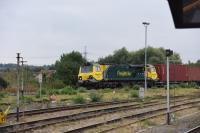
Didcot Parkway: Freightliner 70015 northbound to Oxford at 1141 hours.
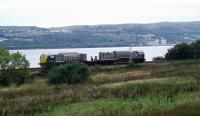
Cardross: My annual photograph of the (what I call) Leaf Train - it's back!
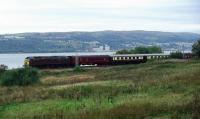
Cardross: West Coast Railway Company service 1Z80 from London Kings Cross to Fort William approaching Cardross.
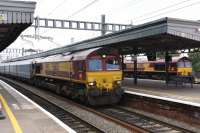
Didcot Parkway: DB Schenker 66132 departing Didcot eastbound with a loaded car train, I assume for Southampton, with 66077 in the background at 1116 hours.
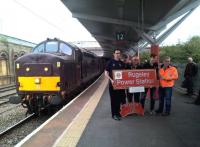
Crewe: I wonder where they've been? Passengers on the 'Cliffe Hopper' railtour see image [[57204]] pose with a nameplate which they just won in a charity auction. The locomotive is 37.668.
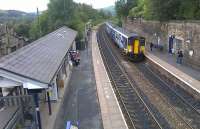
Greenfield: A four-car Sprinter service slows for the Greenfield stop working from Manchester to Huddersfield via the Standedge route on 7th October 2016. Note the curious little waiting room built into the retaining wall on the Eastbound Platform 2.
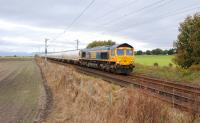
Geilston Level Crossing: Autumn colour as 66740 passes south with the smelter empties.
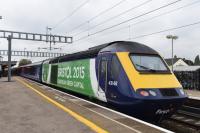
Didcot Parkway: First Great Western HST 125 43148 eastbound. Decorated with "Bristol the Green City". @ 1418 hours.
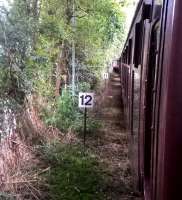
Cliffe Vale: There is something surreal about passenger coaches adjacent to wagon number boards on a freight-only branch. This particular branch at Cliffe Vale brings china clay from Cornwall to Stoke-on-Trent, the train is the BLS 'Cliffe Hopper'. [Ref query 286]
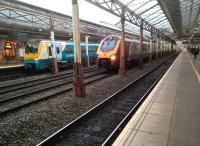
Crewe: A down Voyager passes an EMU at Crewe in October 2016.
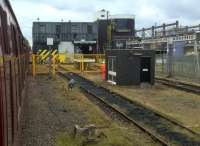
Rugeley Power Station: The completeness of the coal unloading bunker is deceptive; all generation has stopped, and the power station will soon be demolished. The train is the Branch Line Society 'Cliffe Hopper' railtour.
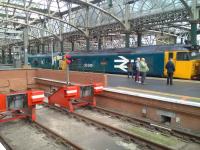
Glasgow Central: Class 50s 50007 and 50049 on arrival at Glasgow Central from Crewe on 7th October 2017.
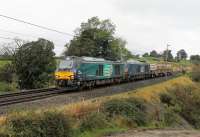
Bay Horse: DRS 68017 Hornet and nearly new 68032 take the Sellafield to Crewe flasks south through Bay Horse on Saturday 7th October 2017.
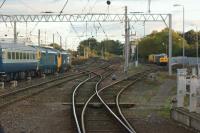
Carlisle: 'The Caledonian' railtour departing Carlisle southbound on 07 October 2017 with 50049 and 50007. Over on the right is 50008 stabled in High Wapping sidings after it had worked north with a rail grinder a few days earlier. Three Class 50s in the same photo at Carlisle was not something I expected in 2017!
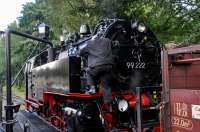
Drei Annen Hohne: HSB 99 222 taking water at Drei Annen Hohne before taking the 15:53 train to Wernigerode on 19 September 2017. This locomotive features on the tickets for the Wernigerode-Brocken Summit service See image [[61799]].
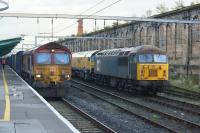
Carlisle: 66111 pauses at Carlisle whilst working a Daventry to Grangemouth container train on 7th October 2017. In the sidings on the right 56303 is stabled with a rail grinder.
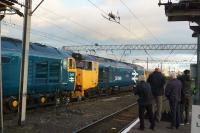
Carlisle: The southbound 'Caledonian' railtour departs Carlisle with 50049 and 50007 on 7th October 2017 with the platforms full of enthusiasts trying to record the event.
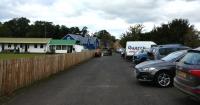
Wooler: This is the railway formation just before Wooler Station. It is now used as the car park for the Bowling club which is on the left, a hive of activity with the annual laying away of the green taking place.
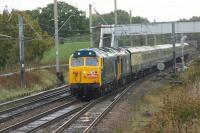
Balshaw Lane Junction: Class 50s at 50. 50007 and 50049 recreate a late 60s/early 70s trip as they head north at Balshaw Lane Jct on 07 October 2017 with 'The Caledonian' railtour from London to Glasgow. The Class 50s replaced a Class 87 at Crewe in a bid to further recreate the days before the wires crossed the border.
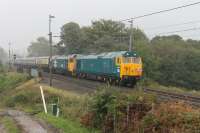
Bay Horse: The 50s are 50!. To celebrate The Caledonian ran from Euston to Glasgow and return with D407 (50007) Hercules and 50049 Defiance taking over from an electric loco at Crewe - just like the good old days. For the first time in many years Class 50s double head a passenger train through Bay Horse - 7th October 2017.
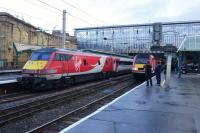
Carlisle: With engineering work taking place between Newcastle and Edinburgh, ECML services were diverted via Carlisle. On 07 October 2017, on the left is a southbound Mk 4 set which will have a Class 67 attached to drag it to Newcastle while on the right an Aberdeen bound HST is almost ready to depart.
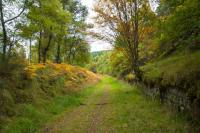
Castle Grant Platform: Autumn in Speyside. This was the route of the original line north from the south to Forres looking south at the long hard climb from Grantown to the twin summits at Dava. The trackbed is now the Dava Way.
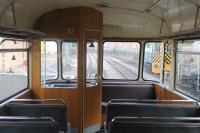
Interiors: One of the two saloons on the Waggon und Maschinenbau railbus E79960, presently on the Ribble Steam Railway. Dating from 1958 it has a classic interior from that period, in terms of seats and panelling, but there are quirks - not least the leather strap on the drop lights. All seats face the front windscreen, except the small bench alongside the driver's compartment.
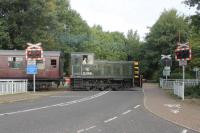
Preston Riverside: Class 03 D2148 emerges from the RSR yard area and crosses Lockside Road with a passenger train during the 2018 Autumn Diesel Gala.

Dava: Dava, south of the former station. Bleak and open moorland pierced by the former main line. Wonderful, remote, beautiful in sunshine and cruel in winter. In 1883, when still the main line north, a livestock train was trapped in deep snows south of the station leading to the death of the animals. (It's a panoramic view not a junction!)
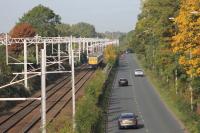
Preston Maudlands: 319381 runs under the new wires alongside 'Tom Benson Way' as it approaches Preston with a Blackpool North to Manchester service on 7th October 2018. The road occupies the solum of the former fast lines. The four track section originally ran from Preston to Kirkham.
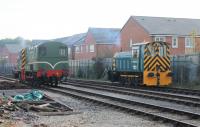
Preston Riverside: A new diesel shed has been constructed by the Ribble Steam Railway, sitting alongside the line between the station and bitumen sidings. At the 2018 autumn diesel gala this led to a small procession of locos making their way down to the station ahead of the day's duties. Class 05 D2595 is moving to stable alongside the platform while Dutch Class 11 NS 663 and Class 03 D2148 are heading to the carriage shed for the MkI rake.
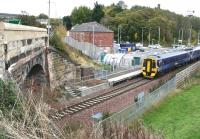
Newtongrange: The 0945 Tweedbank - Edinburgh calls at Newtongrange on 7 October 2018. In the centre background is the long vacant office building of the former Dean Oil Works, on which work is currently underway as part of the Apex Scotland 'Track 2 Train' project see image [[65898]].
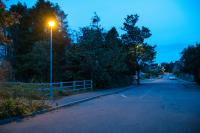
Forres [2nd]: Site of the Forres station level crossing, on the east to south curve of the second Forres station, in October 2018 See image [[28610]]. The Royal Station Hotel is still there, behind the trees, now known as the Royal Hotel.
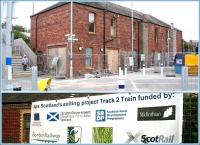
Newtongrange: The station at Newtongrange stands on the site once occupied by the Dean Oil Works, of which the former office building still survives. Work is now underway on an Apex Scotland 'Track 2 Train' project which will see the old building turned into a community hub, containing a cafe/bistro, training and learning facilities etc. View is from the station platform on 7 October 2018. The sponsors list is shown below. See image [[69561]]
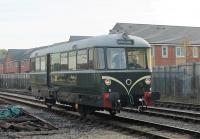
Preston Riverside: The North Norfolk Railway railbus, E79960, has been on loan to the Ribble Steam Railway for several years now. During the Autumn 2018 Diesel Gala it made the first trip of each day and is seen here on the Sunday morning making its way from the diesel shed to the platform, just prior to the 1100hrs departure.
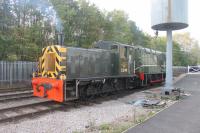
Preston Riverside: Probably the best looking BR diesel shunter (just a personal opinion) Class 03 D2148, coupled to Dutch Class 11 NS.663, makes its way from the RSR diesel depot to the carriage shed prior to the day's services at the autumn diesel gala. 7th October 2018.
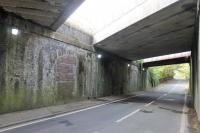
Lea Road: The station at Lea Road closed in 1938 but 80 years later the bricked up entrance to the island platform can still be seen. Only the (rebuilt) central span carries tracks now. Lea Road station was originally in open countryside some distance from Lea but the Preston suburbs have grown outwards and beyond it in the intervening years. [Ref query 7 October 2018]
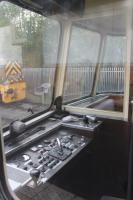
Interiors: The neat control desk of the Ribble Steam Railway's on loan Waggon und Maschinenbau railbus E79960. The removable gear selector handle and throttle control are in place to allow it to be driven from this end. Photographed at the Autumn 2018 RSR Diesel Gala.
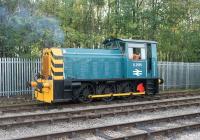
Preston Riverside: Hunslet 0-6-0DM, D2595, one of only four surviving Class 05 shunters, is stabled opposite the Ribble Steam platform awaiting its rostered turn during the 2018 Autumn Diesel Gala.
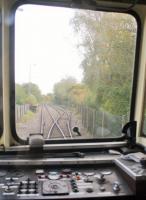
Strand Road Exchange Sidings: View of the Strand Rd Exchange Sidings through the cab of the RSR Railbus as it heads back towards the museum platform during the 2018 Autumn Diesel Gala.
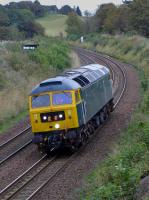
Donibristle: 47727 failed on the northbound Aberdeen portion of the Caledonian Sleeper at Ladybank on 7 October. A pair of 73s took the train onwards while the 47 returned in shame to Craigentinny, seen here at Donibristle.
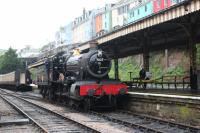
Kingswear: Having just arrived at Kingswear from Paignton, 7827 'Lydham Manor' pulls forward to run round before its return journey on 7th October 2019.
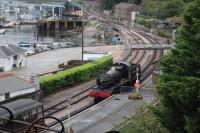
Kingswear: 7827 'Lydham Manor' draws forward on to its coaches at Kingswear, having run round prior to its return journey to Paignton on 7th October 2019.
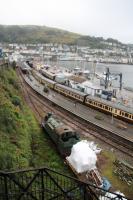
Kingswear: Elevated view of Kingswear station, with Dartmouth across the estuary and a ferry plying its trade between the two. A GWR Class 5101 2-6-2T awaits restoration in the headshunt. 7th October 2019.
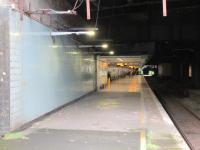
Glasgow Queen Street Low Level: A look west along the westbound platform at Queen Street Lower Level. Though I can't remember what was there before the area in the foreground seems to have been opened out fairly recently and lighting installed. I would imagine the now uncovered pale blue tiling dates from the 1960 modernisation when the Blue Trains were introduced.
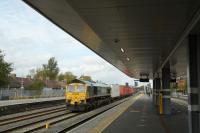
Oxford: 66533, southbound with a Freightliner intermodal service from Gresty Lane, passes through Oxford on 7th October 2020 heading to Southampton MCT.
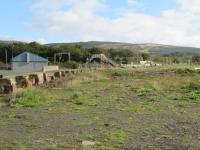
Craigendoran Pier: View towards the Craigendoran station with the exiguous remains of the pier platforms in the foreground. The rotting pier stanchions are in the Clyde behind me. The station footbridge was being looked over by a man with 'Painting Contractor' helpfully written across his back. A repainting out of the faded, obsolete SPT colours is in prospect.
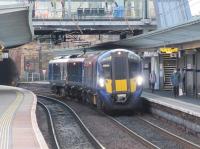
Haymarket: A Glasgow Central stopping service calls at its first stop on 7 October 2020.
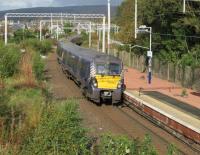
Craigendoran: A Helensburgh to Edinburgh service makes its first stop on 7 October 2020. Craigendoran station is not what it once was, but to be fair, Craigendoran itself is hardly a metropolis.
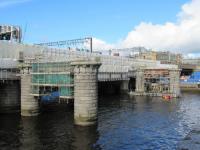
Clyde Viaduct [Glasgow Central] [1st]: The Clyde Bridge is getting a makeover, as are the piers of the old bridge - note the inscription in ancient Greek and English. The wee red rescue boat, with a crew of two, is poised to fish out any contractors who fall in. View looks north towards Central Station on 7 October 2020.
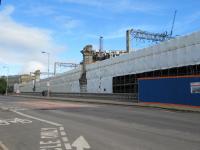
Clyde Viaduct [Glasgow Central]: A plastic-shrouded Clyde bridge as seen from King George V Bridge with Central station just visible. The images posted on the hoardings are not visualisations of the finished work, just photos of how it looked before work started. It had better be worth it.
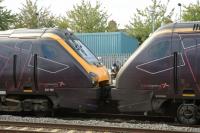
Didcot Parkway: Arriva Cross Country units, Manchester bound, at Didcot on 7th October 2020. The heavy outside frame (de-activated) tilting bogie of 221139 is very different to the lightweight one under 220008.
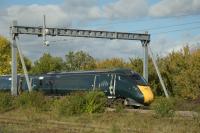
Oxford: GWR 800-001, Paddington bound from Oxford on 7th October 2020.
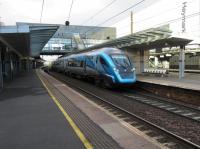
Haymarket: A TPE service from somewhere to Edinburgh nears journey's end on 7 October 2020. That vertical 'Haymarket' seems to hang in the air. I've never been sure who it is aimed at; it is quite invisible from the platforms and from street level, though can be seen briefly from the top deck of a bus on Dalry Road.
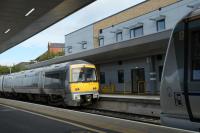
Oxford: Chiltern 168001 arriving in Oxford from London Marylebone. These were the old LNWR/LMSR platforms and used as a parcels siding until Chiltern Railways upgraded the line.
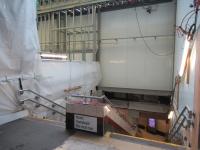
Glasgow Queen Street Low Level: Work in progress. Access from the High Level station to the westbound Low Level platform is still by these ageing steps, but something a little fancier is clearly afoot. We now have daylight for a start. A recorded voice (who sounded like actor Gordon Kennedy) used to constantly remind us here to 'always hold the handrail and take care on the stairs'.
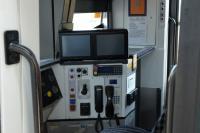
Oxford: A view of the cab and controls of GWR DMU 165125, in the platform at Oxford on 7th October 2020.
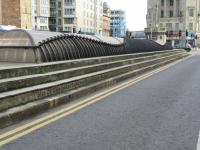
Glasgow Cross: A photo with its own caption so I'll shut up.
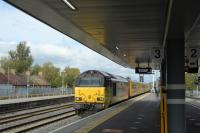
Oxford: Colas 67023 passing south through Oxford with a Network Rail Test Train on 7th October 2020. 67027 was at the rear.
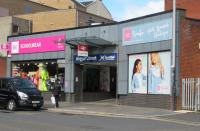
Argyle Street: Argyle Street station's 'back door' in Osborne Street is like a scaled-down version of the main entrance in Argyle Street itself. In my day we wore black woollen blazers to school but today they are evidently more hazardous places.
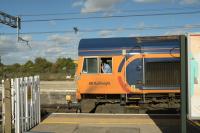
Didcot Parkway: GBRf 66737 should have been heading north to Oxford etc but alas, just as it crossed the Oxford bound points at Didcot, a failure occurred and the train ground to a halt. No idea why but all went quiet. 7th October 2020.
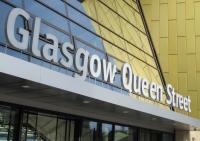
Glasgow Queen Street High Level: Officina Sans Bold is not usually quite as bold as this. Lettering above the front entrance, facing George Square. I wonder why the E&G didn't choose George Square as the name for its new station? After all it was never on Queen Street itself and George Square was certainly well established by 1842
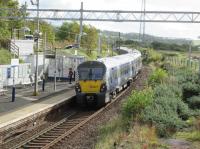
Craigendoran: An Edinburgh to Helensburgh service nears journey's end at Craigendoran on 7 October 2020. Notice how close the banner repeater is to its associated signal, the Craigendoran Junction home, and how it is placed on the 'wrong' side.
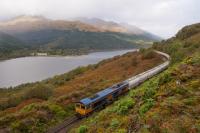
High Morlaggan Railway Cottage: Day in, day out, (with very few exceptions) the Alcan train has kept the Lochaber Smelter going during the COVID-19 crisis and the smelter itself has remained open. An autumnal view of 66733 heading south above above Loch Long. The train is approaching the tight curves just before the turn inland to Glen Douglas.
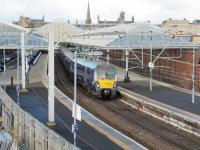
Helensburgh Central: An Edinburgh service prepares to depart Helensburgh on 7 October 2020. Only one of the three platforms suffices for most of the day with trains not hanging around too long.
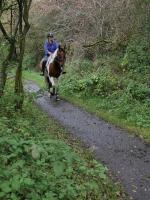
Townhill Power Station: A one-horsepower unit on the bridleway, which was once the West of Fife Mineral Railway between Lilliehall Junction and the former connection to Townhill Power Station. The siding remains in place to the left in October 2021, forty eight years after closure.
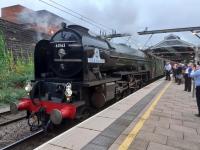
Preston: A1 pacific 60163 'Tornado' has a rest at Preston on 7 October 2021, having hauled a Northern Belle charter from Carlisle. The loco is at the north end of the station, and after receiving a lot of attention from passengers set off to Carnforth, while the coaches headed south to Coventry with 57601 on the front.
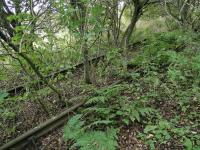
Townhill Power Station: The last train to Townhill Power Station, near Dunfermline, ran in 1973 and the main line track was lifted shortly afterwards. Remarkably, the connecting siding remains in place almost fifty years later. Several hundred feet of bullhead track hide in the bushes, seen here on 7th October 2021.
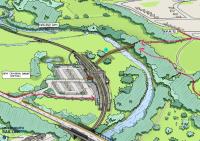
Cameron Bridge: Levenmouth Line; a perspective view of the proposed station at Cameron Bridge.
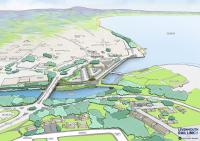
Levenmouth: Leven perspective view. [An aerial view of the proposed station - to be named Leven or Levenmouth? - with lozenge shaped shelter. -RS]
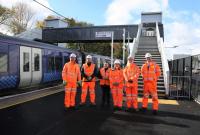
Johnstone: New Johnstone station footbridge 'bridges accessibility gap'.
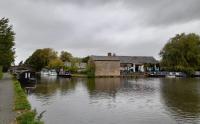
Garstang: The old canalside buildings at Garstang Basin now form the Tithebarn Inn and the area outside is popular in summer. On a cold wet October day however any customers were staying inside. This view looks northwards along the towpath of the canal with the basin opening out on the right and the town is beyond that.
Events
Events from the chronology which occured on this day. This generally lists events before 1995, the creation of the website.
News
These are old news items which which occured on this day. This generally lists events after 1995, the creation of the website.
| Year | Companies | Description |
|---|---|---|
| 2001 | Railtrack in Railway Administration | Railtrack is placed in administration following refusal of a request for further Government funding which would prevent the compnay from becoming insolvent. The future is not clear at the time of writing. Railtrack Group owns a number of businesses, including Railtrack PLC, some of which is may be allowed to retain. Compensation for shareholders is proving complicated to arrange. |
| 2003 | Iron Roads to the Far North and Kyle by Michael Pearson launched | Michael Peason^s latest book in the "Iron Road" series has been launched. This volume covers the lines from Inverness to Kyle of Lochalsh, Thurso and Wick. |
| 2003 | Memorial Seat to Frank Spaven unveiled | A memorial seat to Frank Spaven was unveiled at Inverness Station prior to a meeting of the Highland Rail Partnership. Frank Spaven was the first head of planning at the Highlands and Islands Development Board and was instrumental in the saving of the Far North and Kyle lines from Inverness. |
| 2003 | Railway bridge in Inverness re-opened after repairs | The damaged bridge over Shore Road in Inverness was re-opened at 1509 on the 7th. This is a temporary repair made with girders delivered from the railway engineering depot at Shettleston in Glasgow. Complete repairs are likely to cost £1.2M whereas the temporary repair cost £200,000. |
| 2004 | Protests stop cuts to train service on commuter line [Scotsman] | THREATENED cuts to a fast-growing rail service into Edinburgh have been averted after lobbying by ministers and passenger groups. |
| 2004 | Dunbar rail service cuts bid scrapped [Scotsman] | THREATENED cuts to a popular rail service into Edinburgh have been averted after lobbying by ministers and passenger groups. |
| 2008 | Off the rails? [BBC News Article] | How rail strike is affecting travellers in Scotland |
| 2008 | Talks to avert second rail strike [BBC News Article] | Union leaders are to meet Network Rail bosses in a bid to avert a second day of strike action by signal workers. |
| 2008 | BARNHAM RE-SIGNALLING PROJECT: ADVANCE NOTICE OF TEMPORARY ROAD CLOSURE AT WOODGATE LEVEL CROSSING [Network Rail Article] | |
| 2008 | CALL TO SUSPEND STRIKE WHILE NEW TALKS TAKE PLACE [Network Rail Article] | |
| 2008 | NETWORK RAIL APPOINTS NEW MEMBERS [Network Rail Article] | |
| 2009 | Risks to funicular ^not reviewed^ [BBC News Article] | A major backer of a mountain railway is criticised for not taking account of risks before construction work started. |
| 2010 | Speech to New Civil Engineer Rail Summit [DfT PR] | Speech by Theresa Villiers, Minister of State for Transport, to the New Civil Engineer Rail Summit covering key railway issues including costs, reform, major projects and high speed rail policy. [From Mark Bartlett] |
| 2011 | Millions stroll in New York^s park in the sky [BBC News] | One of the runaway hits of this past summer in New York has not been on Broadway - instead it has been at a most unusual park which is attracting millions of visitors from all around the world. [From Andrew Wilson] [See Railscot News Item of 18 June 2011] |
| 2011 | Cost-cutting threat to rural rail stations [Herald] | THE future of 22 rural train stations used by only a handful of passengers every week is under threat after Network Rail said the facilities were “driving up” the cost of running Scotland’s railway. An industry report highlighted the “low footfall” stations, the majority of which are in the Highlands, including six which attract an average of one passenger for every 10 trains – or even fewer – that pass through them. The findings will heap pressure on the Scottish Government to reconsider their future when setting out its funding priorities next summer for the period between 2015 and 2019. Network Rail, which owns and operates the UK’s track and signals, said it was not always apparent the stations were providing a “valuable social link” for the high level of subsidy they required. Stations with low footfall have a high ratio of cost per passenger. This drives up the costs of operating trains on these lines A spokesman for the company said: “Stations with low footfall have a high ratio of cost per passenger use. These stations drive up the costs of operating trains on these lines. “It is Network Rail’s role to highlight these cost drivers to the government and wider industry for consideration.” The report, the Initial Investment Plan for Scotland, called for cost-saving to lower the £700m annual taxpayer support for running the rail network north of the border. Of the 22 low-footfall stations, five are on the West Highland Line to Oban and Mallaig, six on the Far North Line connecting Inverness to Wick and Thurso and six on the line from Inverness to Kyle of Lochalsh. But they also include a number of stations on busier routes such as Breich on the Glasgow Central to Edinburgh line and Springfield in Fife. Barry Links in Angus, which has only one train in each direction every day, had the lowest footfall of any Scottish station, with just 90 passengers a year, while its neighbouring station, Golf Street, had 190. Many of the stations in the Highlands are request stops at which trains do not stop unless signalled by a passenger on board a train or at a platform. But the low number of passengers meant the ticket revenue was not even enough to pay for the fuel used by stopping a train and then accelerating out of the station, the IIP report found. The report also highlighted the Girvan to Stranraer line, which it found has only 11 passengers per train, a figure it said was likely to diminish with the closure of Stranraer ferry terminal. By contrast, Edinburgh to Glasgow provides more than one-quarter of ScotRail’ s revenue and journeys. One-third of the Strathclyde population used a train in the past month, compared with only 11% in the Highlands and North-east, where people are far more dependent on the car. A spokesman for Transport Scotland, which funds the Scottish rail network and is responsible for the ScotRail franchise, would only say that delivering a “lower cost railway” would be central when it came to specifying funding priorities. Previous attempts to close low-use stations have failed after protests by local communities who claimed they provided an important social link. A similar IIP report produced in 2006 called for a number of stations to be closed but the recommendations were rejected by the then Scottish Executive. However, industry analysts said there was now greater pressure on the UK and Scottish governments to achieve cost savings given the squeeze on public finances and recent findings that Britain’s railway costs around 30% more to run than similar European railways. ScotRail, which operates 95% of passenger trains in Scotland, said low-use stations went back to the days of British Rail and were inherited when it was awarded the franchise in 2004. |
| 2013 | Train drivers in strike vote over 6.4% pay rise [Herald] | A WAR of words has broken out between ScotRail and the train drivers^ union as a pay dispute threatens to cause severe disruption to rail users across a large area of Scotland. |
| 2014 | Dutch firm Abellio wins ScotRail franchise from FirstGroup [BBC News] | Dutch rail operator Abellio will run ScotRail services from April 2015, after promising to invest millions in improving services. It will take over from Aberdeen-based FirstGroup, which has run most Scottish rail services for the past 10 years. |
| 2015 | Edinburgh tram inquiry: Six million documents to be examined [BBC News] | The Edinburgh trams inquiry will examine six million documents as part of its investigation into what went wrong with the project. Speaking at the first preliminary hearing, Lord Hardie, who is leading the probe, said it would not determine why the project went ahead. He also said it would not decide if anybody was legally responsible or financially liable. |
| 2016 | Scotrail under fire as third of routes see more than half of trains arrive late [Herald] | TRAINS are more likely to be late than on time on a third of Scotland^s routes, leading to calls for new action against the Dutch operators of the ScotRail franchise. New figures reveal that almost 90 per cent of trains arrive late to Glasgow High Street, Arbroath, Ardrossan Harbour and Arbroath stations, with passengers arriving at 22 other locations also more likely than not to be delayed. Meanwhile, rush hour fares, which commuters often have little option but to pay, have soared by three times more than average wage rises since the turn of the decade. A peak-time return ticket between Edinburgh and Glasgow now costs £23.30. |
| 2016 | French train firm unveils plans for £20m plant in north-west England [Guardian] | The French train company Alstom is to build a new multimillion-pound plant in the north-west of England, delivering a major boost to the region during a time of uncertainty about Britain’s exit from the European Union. Alstom will spend an initial £20m on a new site at Widnes, Cheshire, creating about 600 jobs. The facility will modernise the Pendolino trains on the west coast mainline and contain a training academy, but it could eventually manufacture new rolling stock if Alstom wins a contract to produce trains for London Underground or HS2. [From Mark Bartlett] |
| 2016 | Plans lodged for new Inverness Airport rail station [Press and Journal] | A new rail station at Inverness Airport could be built by next year after the plans were officially lodged yesterday. The application for the £5million development at Dalcross has been submitted to the local authority after more than a decade on the drawing board. The 568ft platform will be built by December next year, if the plans are approved, and the station will be open before the end of 2018. The first phase of development will incorporate car parking for 150 vehicles, including park and ride facilities. [From Crinan Dunbar] |
| 2017 | Self-driving trains to run on Londons rail network for first time [Evening Standard] | Self-driving trains will run on Londons rail network for the first time. The trains than can accelerate and brake more efficiently than those operated by a driver will be brought in under plans to boost the number of services at packed city centre stations. Testing is currently being carried out on the Thameslink line through central London. |
| 2019 | Cat who caught train from Dunbartonshire to Edinburgh is making a habit of travelling around Scotland [Scotsman] | George is a curious cat who has his own social media page to document his adventures - as he attempts to hitch free rides around Scotland. |
| 2019 | Technical failure causes major disruption to Arran ferry route [BBC News] | CalMac^s MV Caledonia Isles is unable to operate between Ardrossan and Brodick due to broken infrastructure. |
| 2019 | Train cancellations as lorry remains trapped under railway bridge [Press and Journal] | A busy north road is closed, and trains have been cancelled after a lorry crashed into a rail bridge at 11am this morning. |
| 2019 | Santa steam trains 2019: Tickets, times and everything you need to know [The Scotsman] | A highlight of the festive season for many, the Santa steam trains are back for 2019. |
| 2019 | ScotRail^s new digital system signals change for the better [Barrhead News] | GSM-R allows ScotRail^s signalling control centre to make customer announcements through the train^s on-board PA system. |
